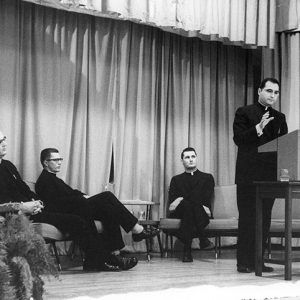calsfoundation@cals.org
Joseph Henri Biltz (1930–1987)
The Reverend Joseph H. Biltz, a Roman Catholic priest and human rights activist, was a staunch supporter of social and Church reform in Arkansas. His outspoken advocacy for reform brought him into direct confrontation with both religious and civil authorities.
Joseph Henri Biltz was born on May 29, 1930, in Little Rock (Pulaski County) to Maurice Biltz and Hilda Rumbach Biltz. He studied philosophy at St. John’s Seminary in Little Rock, receiving his bachelor’s degree in 1951. He then completed four years of additional study in theology and was ordained by the Catholic Church in 1955 at St. Andrew’s Cathedral. He went on to earn a master’s degree in theology (1957) and a doctorate in moral theology (1962) from the Catholic University of America in Washington DC before completing two years of post-doctoral study in theology (1963–1964) at the Academia Alfonsiana in Rome, Italy. An accomplished student, Biltz later completed coursework for a master’s degree in studies in aging from North Texas State University in Denton, Texas, followed by a residency at the Isabelle Geriatric Center in New York City; the master’s degree was awarded in 1979.
He was an assistant professor of theology at St. John’s Seminary in Little Rock from 1959 to 1966 (excluding 1963–1964, when he was completing his post-doctoral studies) and served as Dean of Students of the College and Theology Departments from 1961 to 1966. Throughout his early career, Biltz’s interest in human rights and community activism was apparent; he served as a member of the Steering Committee of the Little Rock Conference on Religion and Race (1964–1967), Little Rock Catholic Inter-racial Council (1963–1967), Little Rock Diocesan Ecumenical Commission (1966–1967), and Arkansas Council on Human Relations (1963–1967). In 1967, he left St. John’s Seminary and served as pastor of St. Francis of Assisi Church in Forrest City (St. Francis County) for a short time. There, he initiated a Headstart program and organized the Bi-racial Forrest City Council on Human Relations, serving as co-chair.
From 1967 to 1971, Biltz was an associate professor of theology at Mount Angel College in Oregon, where he continued his commitment to service on the President’s Student-Faculty Advisory Board (1968–1971) and as faculty advisor to the Black Student Union (1969–1971). Biltz helped the United Farm Workers in Oregon organize during grape and lettuce boycotts, proposed and later supervised using the college dormitories as housing for migrant workers, and volunteered with the Valley Migrant League to help families receive services. He also counseled campus conscientious objectors to the Vietnam War.
Reacting to his involvement with migrant workers, the Church transferred Biltz back to Arkansas, where he worked for one year on the staff of St. Thomas Aquinas University Parish at the University of Arkansas (UA) in Fayetteville (Washington County) and as associate pastor of the University Parish. In Fayetteville, he continued his work with the United Farm Workers, organizing and chairing the Lettuce Boycott Committee, and served on the Diocesan Commission for Hospital Ethics before leaving to complete the coursework for his second master’s degree. From 1975 to 1978, Biltz served in Arkansas as resettlement director of the Diocese of Little Rock’s Indochinese Refugee Resettlement Program, diocesan coordinator of “Liberty and Justice for All—Call to Action,” and associate director of Catholic Charities and Social Services.
Biltz held several prominent positions throughout his years of service, including Director of the Office of Justice and Peace for the Catholic Diocese of Little Rock (1978–1987), Diocesan Coordinator of Prison Ministry (1984), and chairman of the Urban League of Arkansas (member 1979–1987, chair 1985–1987). He was a co-founder of the Arkansas Coalition to Abolish the Death Penalty (1977); served on the Planning and Program Committee of the Arkansas Chapter of the National Conference of Christians and Jews, now known as Just Communities of Arkansas (1976–1985); and helped organize the Arkansas Interfaith Tack Force for Central America (1980). Additionally, Biltz served on administrative and advisory boards for a number of organizations, including the Arkansas Conference of Churches and Synagogues, the Criminal Justice Ministry of Arkansas, and the Arkansas Peace Center.
Biltz’s commitment to social justice, which was unpopular with Church officials, continued in the later years of his career. In 1983, Biltz made headlines by accompanying anti-nuclear weapons protestor James Sauder to a Titan II Missile silo, where Biltz prayed while Sauder spread holy water. In 1985, Biltz was arrested with forty-four protestors while protesting apartheid in front of the South African Embassy in Washington DC.
Biltz died of a heart attack on November 29, 1987. Upon his death, Monsignor Royce Thomas, vicar general of the Catholic Diocese of Little Rock, was quoted in the Arkansas Democrat as saying that Biltz “was a voice for the voiceless and a champion for the underdog. He tried to help those who could not help themselves.” In a retrospective published in the Arkansas Catholic thirty years after his death, Msgr. John O’Donnell said of Biltz, “He went from being a little altar boy with the shiny shoes and combed hair into a revolutionary.”
For additional information:
“Father Joseph Biltz Dies of Heart Attack,” Arkansas Catholic, December 4, 1987, p. 1.
Hanson, Aprille. “The Prophet of Arkansas: Father Joseph Biltz.” Arkansas Catholic, November 27, 2017. Online at https://www.arkansas-catholic.org/news/article/5400/The-prophet-of-Arkansas-Father-Joseph-Biltz (accessed October 30, 2025).
“Joseph Biltz, Social Activist, Catholic Priest.” Arkansas Democrat, December 1, 1987, p. 6A.
“Much Talked-about Priest Takes Stand on Issues.” Arkansas Democrat, October 23, 1983, p. 3G.
“Mourners Pay Tribute to Rev. Biltz.” Arkansas Democrat, December 3, 1987, p. 2B.
Reverend Joseph H. Biltz Papers. Butler Center for Arkansas Studies. Central Arkansas Library System, Little Rock, Arkansas.
“Social Activist, Church Leader Dies at 57.” Arkansas Gazette, November 30, 1987, pp. 1A, 9A.
Stephanie Bayless
Butler Center for Arkansas Studies

 Joseph Biltz
Joseph Biltz  Racism Seminar
Racism Seminar 



Comments
No comments on this entry yet.